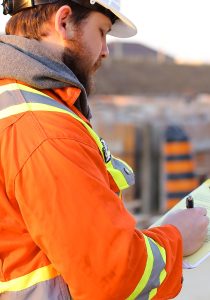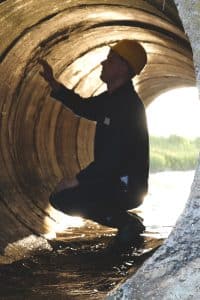Inspection Areas Covered
During a given inspection of a construction site for stormwater compliance, several specific areas will be covered by the inspector:
- Construction runoff: One of the primary concerns for stormwater runoff on a construction site is erosion and sediment control, which must be properly managed to avoid harmful pollutants entering local water sources. Any failure in this realm will result in fines and potentially even project shutdowns, so it’s vital to take all necessary precautions.
- Site conditions: The inspector will also be examining the overall condition of the construction site, looking for any potential issues that could lead to stormwater pollution. This can include identifying areas where materials are stored improperly or where there is excessive debris or waste.
- BMP implementation: Best Management Practices (BMPs) are specific measures put in place to prevent stormwater pollution, such as silt fences, sediment basins, and other erosion control methods.
- Post-construction maintenance: For sites that have already completed construction, the inspector will be checking to ensure proper maintenance is being performed, and any necessary BMPs are still in place and effective.

Documentation
Another major role of the stormwater inspector is to review and verify all necessary documentation related to the site’s SWPPP and compliance efforts. This may include:
- SWPPP plan: The inspector will be checking to make sure that the construction site has a comprehensive Stormwater Pollution Prevention Plan (SWPPP) in place.
- Permits: The inspector will also confirm that all necessary permits are obtained, valid, and displayed on-site for easy access.
- Inspection reports: Inspections need to be done on a routine basis, usually weekly or bi-weekly. These reports detail any BMPs installed, maintenance performed, or areas that are not in compliance. These reports must be readily available for review by local, state or federal agencies.
State Inspectors also Look for:
- Implementation of erosion and sediment control measures
- Maintenance of pollution prevention practices
- Adherence to site-specific stormwater pollution prevention plans (SWPPPs)
- Training in sediment and erosion control and documentation in the SWPPP
- Proximity to special or impaired water that can potentially receive discharge from the site
- Identification of potential and existing violations of stormwater regulations
- Addressing issues such as sediment-laden runoff, improper waste storage, and damaged erosion controls.

Assisting Property Owners and Contractors
There are also several areas where a stormwater inspector may assist property owners and contractors with their compliance efforts:
- Educating: The inspector may provide education and resources to help property owners and contractors better understand stormwater regulations and how to comply with them.
- Advising: If any issues or non-compliance are found during an inspection, the inspector will work with the property owner or contractor to develop a plan for correction and future compliance.
Training
According to the Stormwater Training Center, stormwater inspectors must also undergo regular training to stay up-to-date on all relevant laws and regulations related to stormwater management. This allows them to effectively carry out their role in protecting local water quality.
Being Prepared for Inspections
To ensure a smooth and successful inspection of your construction site, it’s essential to be prepared in advance. Some tips for being ready for a stormwater inspector include:
- Keep documentation organized: Make sure all necessary documents are easily accessible and organized so that the inspector can quickly review them.
- Maintain BMPs: Regularly check and maintain any BMPs installed on-site to ensure they remain effective.
- Train staff: Ensure all staff members are trained on proper SWPPP implementation and maintenance procedures.
By understanding the key roles and responsibilities of a stormwater inspector, you can better prepare for any inspections and ensure your construction site remains in compliance with all necessary regulations.

